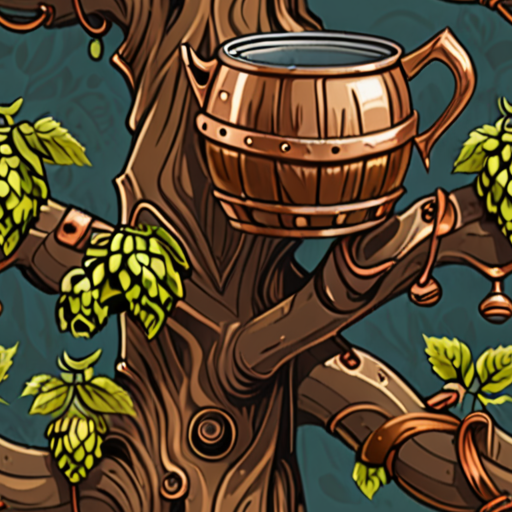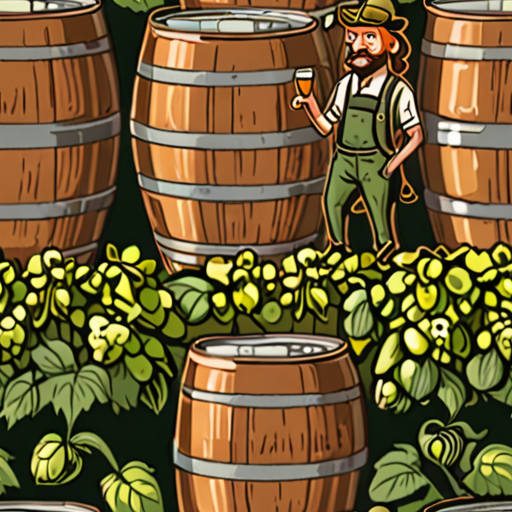For those who have ever savored the rich flavors and aromas of a perfectly crafted beer, the art of beer making can seem like a mystical process, shrouded in mystery and tradition. However, behind every great brew lies a wealth of knowledge and expertise, carefully honed through rigorous training and education in the field of brewing science. In recent years, the demand for skilled brewers has skyrocketed, driven by the rapid growth of the craft beer industry and the increasing popularity of artisanal beers.

What is a Degree in Beer Making Called?
The term for a degree in beer making is often referred to as Brewing Science or Brewing Technology.
- Brewing Science programs typically cover topics such as fermentation science, brewing chemistry, and microbiology.
- These programs may also include coursework in business management, marketing, and entrepreneurship to prepare students for careers in the brewing industry.
Brewing Degree Curriculum
A typical Brewing Science curriculum includes courses in:
- Fermentation Science: Students learn about the process of fermentation, including yeast selection, fermentation conditions, and troubleshooting common issues.
- Brewing Chemistry: This course covers the chemical processes involved in brewing, including malt extraction, hop utilization, and water treatment.
- Microbiology: Students study the role of microorganisms in brewing, including yeast and bacteria, and how to control their growth and activity.
- Brewery Operations: This course covers the day-to-day operations of a brewery, including brewhouse procedures, cellar work, and packaging.
Career Opportunities in Brewing
Graduates of Brewing Science programs can pursue careers in:
- Brewery Operations: Graduates can work in brewhouses, cellars, or packaging departments of breweries.
- Quality Control: With a strong background in brewing science, graduates can work in quality control roles, ensuring that beers meet high standards of quality and consistency.
- R&D: Many breweries have R&D teams that develop new beer recipes and products. Graduates can work in these teams to create innovative beers and products.
Industry Certifications
Many breweries require employees to hold industry certifications, such as:
- Certified Cicerone: This certification demonstrates expertise in beer knowledge, including flavor profiles, brewing methods, and pairing recommendations.
- Certified Brewer: This certification shows proficiency in brewing skills, including brewhouse operations, cellar work, and packaging.
Conclusion
While there isn’t a single “degree in beer making,” Brewing Science and Brewing Technology programs provide students with a solid foundation in the principles and practices of brewing.
The 3:30300 Rule for Beer
When it comes to storing beer, understanding the optimal conditions for preservation is crucial to maintaining its flavor and aroma.
- Temperature: Beer can be stored at three different temperatures: 90°F (32°C), 72°F (22°C), or 38°F (3°C).
- Time: The storage duration varies significantly depending on the temperature chosen: 3 days at 90°F (32°C), 30 days at 72°F (22°C), or 300 days at 38°F (3°C).
This rule helps brewers and beer enthusiasts alike understand how to store beer effectively, minimizing oxidation and preserving the delicate flavors and aromas of the brew.
By following the 3:30300 rule, you can enjoy your favorite beers at their best, whether you’re savoring a fresh IPA or enjoying a rich, complex stout.
For those looking to explore the world of craft beer, understanding the importance of proper storage is essential for appreciating the nuances of different brews.
Whether you’re a seasoned beer connoisseur or just starting to explore the world of craft beer, the 3:30300 rule is a valuable guideline for ensuring your beer stays fresh and flavorful.

Becoming a Brewer: Required Education and Training
To pursue a career in brewing, I recommend obtaining a degree in brewing science or a related field. Many colleges and universities offer programs in brewing science, which can lead to a variety of job opportunities in the industry. Some popular options include:
- A two-year associate’s degree in applied science, which typically includes coursework in brewing principles, fermentation, and brewery operations.
- A four-year bachelor’s degree in brewing science, which may include advanced courses in topics such as yeast management, hop chemistry, and sensory evaluation.
- Certificate programs offered by organizations like the Master Brewers Association, which provide specialized training in areas such as brewing technology, quality control, and brewery management.
These educational pathways can provide a solid foundation for a career in brewing and increase your chances of success in the industry. In addition to formal education, many brewers also gain hands-on experience through internships, apprenticeships, or working under the guidance of experienced brewmasters. By combining theoretical knowledge with practical experience, you can develop the skills and expertise needed to succeed in this rewarding profession.
Does a Brewmaster Need a Degree?
Pursuing a career as a brewmaster often involves gaining a relevant degree, taking brewing courses, homebrewing for practice and experience, entering local brewing contests for feedback, getting hands-on experience through volunteering or entry-level jobs and potentially seeking certification.
- The most common degrees held by brewmasters are in fields like biology, chemistry, food science, or fermentation science.
- Brewing programs can vary in length and intensity, ranging from certificate programs to associate’s or bachelor’s degrees.
- Certification programs, such as the Certified Cicerone program, can demonstrate expertise in beer knowledge and service skills.
While a degree may not be required, having one can provide a solid foundation in the sciences and brewing principles, making it easier to advance in the field.
Key Skills for a Successful Brewmaster:
- Knowledge of brewing ingredients, equipment, and processes
- Understanding of yeast management, fermentation, and flavor development
- Ability to troubleshoot issues and optimize brewing operations
- Strong communication and teamwork skills
Getting Started in the Industry:
For those without a degree, gaining hands-on experience through internships, volunteer work, or entry-level positions can be beneficial.
Additionally, joining professional organizations, attending conferences, and participating in online forums can provide opportunities to network and learn from experienced brewers.
Ultimately, becoming a successful brewmaster requires a combination of formal education, practical experience, and continuous learning and improvement.
Brewmaster Salary at Budweiser
The average hourly pay for a Brew Master in California is $5726 per hour as of December 28, 2024.
- Budweiser employs experienced brewmasters who oversee the brewing process, ensuring high-quality beers meet the company’s standards.
- A brewmaster’s salary can vary based on factors such as location, experience, and specific job duties.
- According to industry reports, brewmasters working for major breweries like Anheuser-Busch InBev, which owns Budweiser, typically earn higher salaries compared to those working for smaller craft breweries.
- Other notable breweries in the United States include Miller Brewing Company and Coors Brewing Company, which may offer competitive salaries for brewmasters.
- While exact figures are not publicly disclosed, we can look at industry averages and reports to estimate the compensation for a brewmaster at Budweiser.
As of our knowledge cutoff in January 2025, the average annual salary for a brewmaster in the United States ranges from $120,000 to over $200,000, depending on the specific role and location.
- Brewmasters play a crucial role in the production of high-quality beers, requiring expertise in brewing techniques, ingredient selection, and quality control.
- With extensive experience and training, brewmasters can advance to senior roles or take on leadership positions within the brewery.
- Industry trends suggest that demand for skilled brewmasters continues to grow, driven by consumer interest in craft and specialty beers.
- For those interested in pursuing a career as a brewmaster, gaining hands-on experience through internships or entry-level positions can be beneficial in developing skills and building connections within the industry.
We strive to provide accurate and up-to-date information, but please note that salaries may fluctuate based on market conditions and individual circumstances.

Can Brewery Owners Make Good Money?
Brewery owners can indeed make good money, with typical profit margins ranging from 20 to 25 percent.
- The key to achieving these profit margins lies in maximizing direct sales through taprooms and implementing efficient operations and smart distribution strategies.
- Initial startup costs for equipment and real estate can be high, but with careful planning and execution, breweries can overcome these challenges and thrive.
Understanding Brewery Profitability
Brewery profitability is influenced by several factors, including:
- Taproom sales: By focusing on direct-to-consumer sales, breweries can increase revenue and reduce distribution costs.
- Distribution strategies: Effective partnerships with distributors and retailers can help breweries reach a wider audience and increase sales.
- Efficient operations: Streamlining production processes, managing inventory effectively, and controlling costs can significantly impact profitability.
Challenges Faced by Brewery Owners
Brewery owners often face unique challenges, such as:
- High startup costs: Initial investments in equipment, real estate, and licensing fees can be substantial.
- Competition: The craft beer market is highly competitive, making it essential for breweries to differentiate themselves and attract loyal customers.
- Regulatory compliance: Brewery owners must navigate complex regulations and laws governing the production and sale of beer.
Best Practices for Brewery Success
To succeed in the craft beer industry, brewery owners should focus on:
- Developing a strong brand identity and marketing strategy.
- Fostering a loyal customer base through excellent customer service and engagement.
- Continuously innovating and improving products and services to stay ahead of the competition.
Conclusion
In conclusion, brewery owners can make good money by focusing on direct sales, efficient operations, and smart distribution strategies. However, they must also navigate unique challenges and adhere to best practices to ensure long-term success in the craft beer industry.

0 Comments